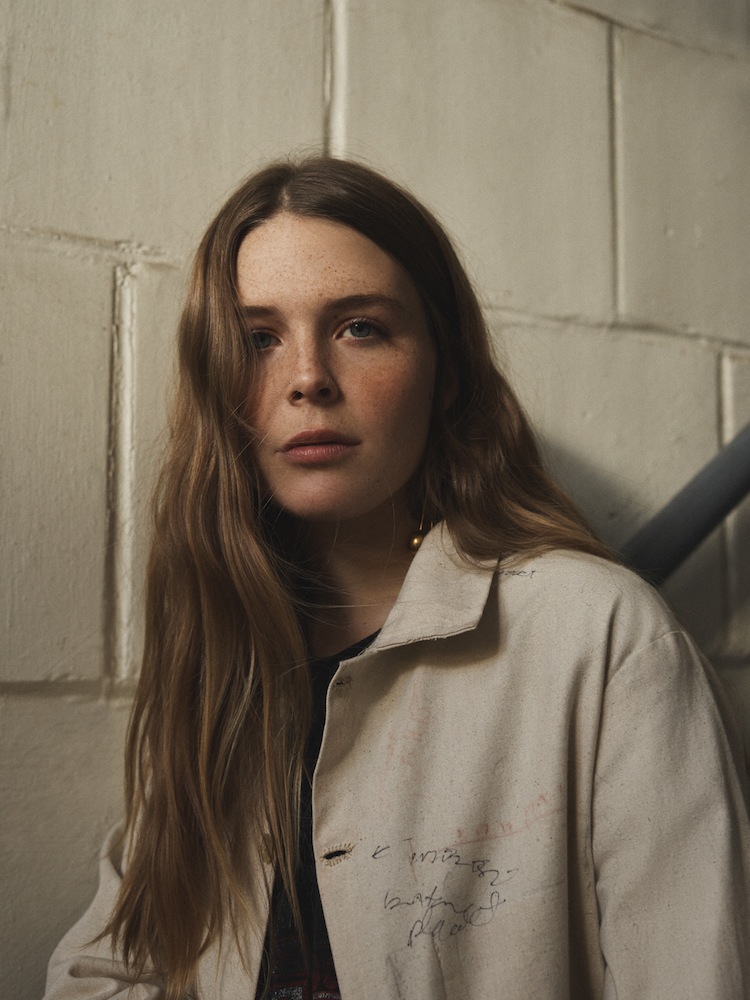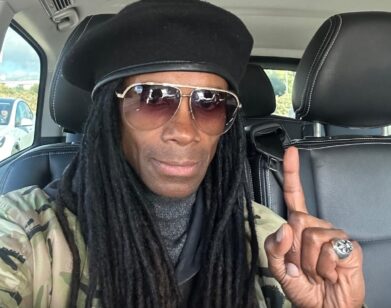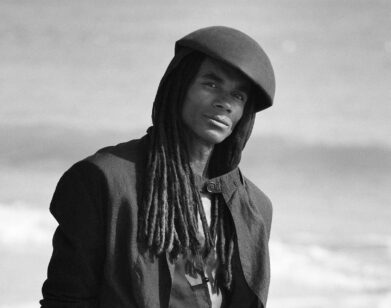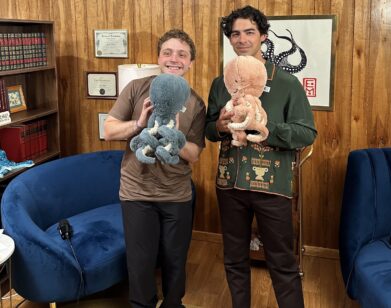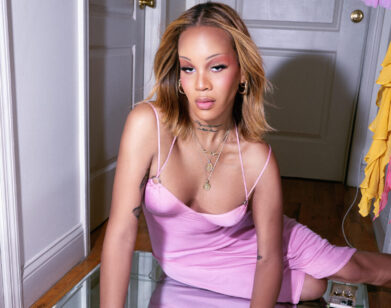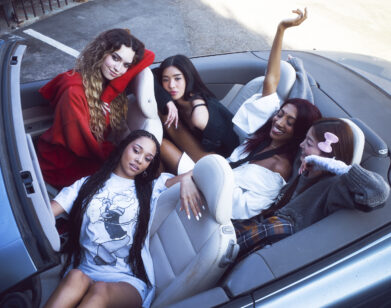The Shapeshifting Singer-songwriter
MAGGIE ROGERS IN NEW YORK, DECEMBER 2016. PHOTOS: HANS NEUMANN. STYLING: BRITT BERGER. HAIR: DAVID COLVIN FOR BUMBLE AND BUMBLE. MAKEUP: CYNDLE KOMAROVSKI FOR HONEY ARTISTS/CHANEL LES BEIGES.
When Maggie Rogers arrived at NYU’s Tisch School of the Arts for welcome week, a professor promptly dubbed her “the banjo girl.” The title fit: back in rural Easton, Maryland, Rogers released two folk records before even graduating high school (Blood Ballet, 2014; The Echo, 2012), and the banjo was her instrument of choice. In New York, she found herself in a hub for live music—which she had sought out for years—but took a break from making it herself, unsure of her sound.
Time abroad changed Rogers’ perspective; while studying in France, she took a trip to Berlin, where friends asked her to go clubbing. Although skeptical (“I always thought that meant heels and tight dresses and money”), she went along given the affirmation that, “You won’t get in if you’re not wearing sneakers.” What she found was an “incredible release” in electronic dance music; it was meditative, and part of mental wellbeing. She returned to New York with newfound creative vigor. Electronic production met the storytelling spirit of folk music, combined with sounds recorded while Rogers was communing with nature. Toward the end of her senior year in 2016, she found herself in a masterclass sitting next to Pharrell, playing the result: “Alaska.”
The video went viral, as did Rogers. Through graduating, getting signed, and seeing a shift in her day-to-day, the 22-year-old surprised herself. “I’ve learned that I’m a lot stronger than I thought I was,” she says. “I always saw myself as this quiet, introspective, thoughtful person. It’s like I’ve just turned the key and unlocked a whole other side of me and it’s been really, really, really fun.”
Rogers’ EP Now That The Light is Fading (Capitol) arrives February 17, 2017, and today the 24-year-old announced that her first-ever North American headlining tour will begin in March. Beyond working on a full-length record and going to band practice, touring is perhaps what she’s most looking forward to in the coming year. “I’m really excited to be able to play and share this music with all the people behind these computer screens,” she says. “You make music to connect, and I’m really excited to be some part of a nucleus of that for people.”
HALEY WEISS: How early did you start playing the banjo?
MAGGIE ROGERS: I started out playing the harp, actually. I played in orchestras all through high school and taught myself how to play guitar. I didn’t actually start playing the banjo until I was in high school. There were always boys with guitars, and I would want to play too. There was always somebody who was better than me or wouldn’t let me play, and there were always four guitar players. But if I was playing banjo, I was offering something different—I could add to a group rather than being a mediocre player of an instrument that everybody else plays. It was a way for me to make a place for myself.
I still love that music and love to play banjo. It’s an African instrument. It’s really crazy, there’s rhythm, and it’s a lot of fun. But its role in music is kind of limited. Especially if you’re the banjo girl, you walk in and it’s assumed that you sing harmony and are an accessory to the group. I didn’t want to do that. I found it really limiting. I actually stopped making music for a while [after starting college] and didn’t know what I wanted to make. That’s just like everybody else, I think—you change a lot in college, like you should as a developing human. I think that as I was changing, I just wasn’t sure of what I wanted to make or who I was. I wasn’t one person for long enough to make something that sounded like myself. I didn’t know what I sounded like.
WEISS: When you weren’t making music, were you focusing on the literature side of things?
ROGERS: I was working on my English degree, and I thought I was going to be a writer. I was interning at magazines and stuff like that, because it’s all telling a story. It’s like poetry and prose. I was just going to tell somebody else’s stories for a while. [laughs]
WEISS: Going to Alaska and hiking was a big turning point for you, right?
ROGERS: Yeah. I went to Alaska in the summer after my freshman year. It’s funny because that song [“Alaska”] is really the story of nine months of my life: going to Alaska, coming back, cutting my hair. I was in a relationship, and [there was] change with people. I think that if you look at the lyrics, the verb tenses are kind of all over the place; the verses are in past tense, the choruses are in present tense, but then the second verse is imperative. I didn’t realize that until I was going back and looking at it; it wasn’t on purpose. It just happened. But yes, that was the catalyst—it kicked off a long period of introspection and development.
WEISS: You’ve talked about how you wanted to combine the storytelling of folk music and some of those sounds from your hiking with electronic music. Are you still doing that, or was that something that you were just interested in at the start?
ROGERS: It was sort of a window for me into all of this. I had this period where I was like, “Okay, I’m ready to make something, what am I going to make?” I knew that I was interested in dance and pop and electronic music. I watched a bunch of interviews and performance footage from Coachella and was kind of studying other artists. I was just like, “Okay, I’m not really that person.” Then I was watching rock bands and folk bands and I was like, “Okay, that’s not really me either.” My initial theory was, “I’m going to be both; I’m going to try and make new music but still keep my same point of view.” I think that the artists that are most successful in the translation of their work are able to cross genres with ease. It’s all their own expression, and that is so true to them that their voice leads rather than the instrumentation defining them. That’s what I’m most interested in. Right now, that’s folk and electronic music. Those are also the two places that I’ve been in my life. I’m sure that that will change too.
WEISS: That’s what Pharrell was reacting to, right? You’re doing what’s true to you; that’s why he was saying it’s “singular,” because you’re pursuing something different that feels right.
ROGERS: Exactly. I was never trying to be or do anything else. I realize now what a gift the video was; all that has happened to me is because I got to this place by really being myself. Even if I created an alter ego to put this music out or had done anything different, inevitably I would find myself in these very vulnerable positions of photo shoots or interviews—anything like that. I think I would start to feel an unraveling rather than how I feel now. All these things are helping me to know myself more. It’s like playing dress-up. It’s like, “Oh, I didn’t know that I would feel like this in these clothes, but right on!”
WEISS: I’m sure you’ve been asked every question about when Pharrell was actually listening to your song, but what happened when you left the room? When you walked out, did you call your parents?
ROGERS: I called my parents. I was like, “I’m not really sure what just happened.” Actually no—I called them later in the day. I walked out and was just really overwhelmed, so I turned my phone off. It was Saturday, I didn’t have anything to do for the rest of the day, so I walked around Chinatown for a while. I ended up at my friend’s house, and I wrote the song [“Better”] that’s the last one on the EP. I was so overwhelmed that I had a hard time remembering that moment for a couple days. It was so crazy that what made the most sense for me was to normalize and almost forget about it as much as possible. I remember walking into my friend’s studio and saying, “I just had this really crazy moment with Pharrell.” And he was like, “Cool. Wanna go get lunch?” It was like, “Huh, that’s weird. Let’s get sushi.”
WEISS: It’s obviously an honor, but is it weird to have this tie to an artist that you met briefly in this one experience?
ROGERS: It’s funny, because everybody has a different impression of what our relationship is. People are always like, “Are you guys friends? Is he helping you?” Obviously I have a world of respect for Pharrell. But I think it’s the coolest thing that he hasn’t been super involved, because what he’s done has given me the opportunity to be my own artist, which is why I totally respect him. So I’m sure that there’ll be a very happy, sweet reunion one day, and I’m looking forward to that. He’s busy—he’s got his own shit to do. He does not need to babysit me. [laughs]
WEISS: So you still live in New York. Do you miss nature? It spurred you to make new music.
ROGERS: That was not just a spur; that’s something that’s very much a part of me and my mental health. I try to leave the city about every six weeks. All through college I had a to-go bag at all times. I have a pack with my sleeping bag, my tent, and my stove. I try to get out in the summers for a month or month and a half at a time. I’ve been to Alaska, spent about a month in Oregon and Washington, and I’m hoping to do the Appalachian Trail in the few years.
I find that I’m really inspired [in nature]. I think this happens to a lot of people who are creators: I get swayed by other people really easily. The city sometimes overwhelms me by taking too much information in at one time, whereas being completely alone with my thoughts it’s, “Okay, this is really a much easier way to think about stuff.”
WEISS: It must be odd to have grown up really interested in live music and folk music, and then have this thing happen on the Internet that makes your real life so different.
ROGERS: It’s simultaneously so bizarre and sort of, very strangely, normal. I always knew and envisioned myself doing exactly this. Obviously I never knew that it would happen this way and this fast, but in a lot of ways it’s been a very weird, seamless transition because it happened literally the second that I graduated from college. I moved out of my college apartment on May 31, and the video went viral June 1. So like every other college grad, I started working. It’s totally crazy the way it’s happened, and it is super strange, but I’ve also been preparing to do this work for the last 10 years. I’ve been writing songs for 10 years. I’ve been studying the industry for the last four. I’ve been playing shows for the last six. It’s simultaneously very strange and very… It’s almost like I’m in grad school.
WEISS: The grad school of life.
ROGERS: [laughs] The grad school of life, yeah. I very much feel like a freshman these days.
WEISS: Were you able to go back home after you graduated?
ROGERS: I think that’s the funniest thing about how all of this happened. You know, the video went viral June 1, and I was at home because I didn’t have an apartment in New York. It was this really weird experience where I’d open my computer and I would suddenly have 100,000 more fans on Facebook. I’d think, “I don’t even know how to quantify that number, that’s ridiculous.” Then I would close my computer and be in my childhood bedroom, and my mom would be like, “Mags, it’s your turn for dishes,” and I’d say, “Okay.” It was this strange dichotomy; I knew intellectually that there was all this change happening, but at the same time I almost felt like I had gone a step backward because I was at home. Then I traveled for a little while like I had always planned to. The song came out and I left like, “Okay, bye.” I had always planned to travel after graduation, so that’s what I did. It’s nice to stick to the plan a little bit.
WEISS: Is there anything you want to say about your music that you haven’t had the opportunity to?
ROGERS: The biggest thing for me is that I’ve only ever wanted to make music. I feel so grateful because I’m in this position where I can wake up and think about music every day, and hopefully make music for the rest of my life. Music for me feels like the most immediate way that I can put positivity into the world. It’s this incredible connector; that’s why I’m doing this.
FOR TOUR DATES AND MORE ON MAGGIE ROGERS, VISIT HER WEBSITE.
For more from our “Faces of 2017” portfolio, click here.

